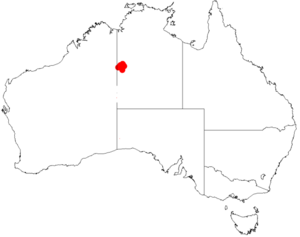Acacia abbreviata facts for kids
Acacia abbreviata is a type of shrub that belongs to the Acacia plant family. It is a special plant because it grows naturally only in the dry, northern parts of Australia. This means it is endemic to that area.
Quick facts for kids Acacia abbreviata |
|
|---|---|
| Scientific classification | |
| Genus: |
Acacia
|
| Species: |
abbreviata
|
 |
|
| Occurrence data from Australasian Virtual Herbarium | |
Contents
What Does Acacia abbreviata Look Like?
This shrub is quite bushy and spreads out. It usually grows to be about 0.3 to 0.6 m (1 ft 0 in to 2 ft 0 in) tall. It can spread out wide, from 1 to 3.6 m (3 ft 3 in to 11 ft 10 in) across.
Bark and Branches
The bark of the plant is usually smooth. It is a pale grey-brown color. You might see tiny cracks in it. The branches are yellowish to reddish-brown. They have small, sticky hairs and faint lines.
Leaves
The leaves are called phyllodes. They are long and thin. They grow in groups of six at each joint on the stem. These phyllodes are usually 0.4 to 2.5 cm (0.16 to 0.98 in) long. They are very narrow, about 0.6 to 1.2 mm (0.024 to 0.047 in) wide. They have faint veins that are hard to see.
Flowers
Acacia abbreviata blooms between April and October. It produces flower-spikes that look like small cylinders. These spikes are 0.7 to 2 cm (0.28 to 0.79 in) long. They are packed with bright golden flowers.
Seed Pods and Seeds
After the flowers, flat, somewhat woody seed pods grow. They are shaped like a long, thin oval, getting narrower at the bottom. These pods are 2.5 to 6.5 cm (0.98 to 2.56 in) long and 3 to 5 mm (0.12 to 0.20 in) wide. They have clear edges and open up from the top. Inside, the seeds are brown and shaped like a narrow rectangle. They are 3 to 4.5 mm (0.12 to 0.18 in) long. Each seed has a small, cup-shaped attachment called an aril.
How Was Acacia abbreviata Named?
The plant was first officially described by a botanist named Bruce Maslin. This happened in 1980. He included it in his work about Acacia plants. This work was published in a science journal.
Later, in 2003, another botanist named Leslie Pedley changed its name to Racosperma abbreviatum. But then, in 2006, it was moved back to the Acacia group.
The first sample of this plant, called the type specimen, was collected in the Tanami Desert. This was done by J.R.Maconochie in 1970.
Where Does Acacia abbreviata Grow?
This shrub is found in a small part of the Tanami Desert. This desert is in the Northern Territory of Australia. It is very close to the border with Western Australia.
You can usually find it growing on stony plains and ridges. These areas often have shallow, clay-rich soils. It grows as part of plant groups that include spinifex grasses.

